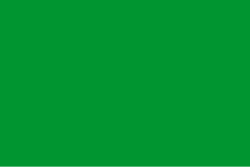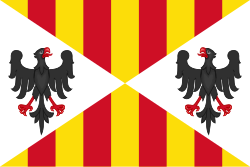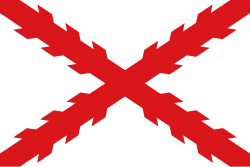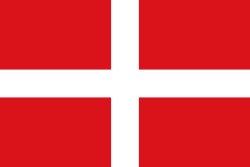The following is a list of flags of Malta .
The following is a list of flags of Malta .
| Flag | Date | Use | Description |
|---|---|---|---|
 | 1964—Present | State flag and naval ensign | White and red, augmented in the canton by a depiction of the British George Cross. Ratio 2:3. |
 | Civil ensign | Red, bordered white and charged with a white Maltese cross. Ratio 2:3. | |
 | Banner of arms of Gozo, second-largest island in the Republic of Malta | Symbolizes the islands nickname, 'The Island of the Three Hills', and also the fact that it is surrounded by sea. |
| Flag | Date | Use | Description |
|---|---|---|---|
 | 1988—Present | National Colour | Identical to the State flag. White and red, augmented in the canton by a depiction of the British George Cross. On the colour boundary there is a golden De Redin tower placed at the middle, and a golden scroll with the words FORZI ARMATI at the bottom. [1] |
| Military Colour | Red at the top and blue at the bottom, bearing at the centre the badge of the Royal Malta Artillery (minus Royal Crown), which is the main predecessor of the modern-day Armed Forces of Malta; the motto TUTELA BELLICÆ VIRTUTIS (Custodians of Military Prowess). The four corners bear the seven-flamed grenade above the scroll reading MALTA, tilted 45 degrees. On the top of the badge there are two battle honours on scrolls, MDCCC (for the Siege of Valletta in 1800), EGYPT 1882. Below the badge there is another battle honour MALTA 1942. [1] | ||
 | 1964—Present | Military ensign | Identical to the State flag. White and red, augmented in the canton by a depiction of the British George Cross. Ratio 2:3. |
 | Naval jack | A George Cross proper fimbriated in red in the centre of a white square, within a red square. Each corner of the red square shall contain a white Maltese Cross. Ratio: 1:1. | |
 | c.1973—Present | Commander of the Armed Forces' Pennant | A red triangular pennant with golden emblem of the Armed Forces. The emblem is a mason tower of de Redin, which represents fortification and Malta defences back to the time of the knights of St. John. |
| Flag | Date | Use | Description |
|---|---|---|---|
 | 831–1091 | Flag of the Emirate of Sicily used in Malta | A Simple Green Field. |
 | 1194–1266 | Banner of Manfred, King of Sicily used in Malta | A White Swallowtail Flag with a Black Eagle in the center. |
 | 1266–1282 | Flag of The Kingdom of Sicily under The Capetian House of Anjou used in Malta | A Blue Field with Several Fleur-de-lis and a red label. |
 | 1282–1296 | 1st Flag of The Kingdom of Sicily under The Crown of Aragon used in Malta | The Aragonese Señera in the first and fourth quarters and the Eagle of Sicily in the second and third quarters. |
 | 1296–1410 | 2nd Flag of The Kingdom of Sicily under The Crown of Aragon used in Malta | Similar to the Aragonese Señera, but with 2 white triangles with an eagle inside of both triangles. |
 | 1410–1516 | 3rd Flag of The Kingdom of Sicily under The Crown of Aragon used in Malta | An inverted version of the previous flag. |
 | 1516–1530 | Flag of the Habsburg Spain used in Malta | A red saltire resembling two crossed, roughly-pruned (knotted) branches, on a white field. |
 | 1530–1798 | Flag of the Order of Saint John used in Malta | Red rectangular flag quartered by a white cross. |
 | 1798–1800 | Flag of France used in Malta | A vertical tricolour of blue, white, and red. |
 | 1800 | Flag of Great Britain used in Malta | A superimposition of the flags of England and Scotland. |
 | 1801 onwards | Flag of Great Britain and Ireland used in Malta | A superimposition of the flags of England and Scotland with the Saint Patrick's saltire (representing Ireland). |
 | 19th century | British Malta State ensign | Red Ensign with a white St George's cross, but no badge. |
 | 1875 – c. 1898 | British Malta State ensign | Blue ensign. Badge: A white Maltese cross on white and red panel framed with ginger-bread. |
 | c. 1898–1923 | British Malta State ensign | Blue ensign. Badge: On a white circle a white and red shield with pointed top and gold border. |
 | 1923–1943 | British Malta State ensign | Blue ensign. Badge: White and red shield with pointed top and gold border. |
 | 1943–1964 | British Malta State ensign | Blue ensign. Badge: On a white circle a white and red flat top shield with George Cross on blue canton. |
 | Before 1943 | Malta Civil Flag (Unofficial) | Undefaced white-red vertical bicolor. Ratio 2:3. |
 | 1943–1964 | White-red vertical bicolor with George Cross on blue canton. | |
 | 1967–1974 | Queen Elizabeth II's Personal Flag for Malta | One of Queen Elizabeth II's personal flags. This flag was used when she was Queen of Malta until it was made redundant by the introduction of a republican form of government in 1974. It featured the arms of Malta in banner form defaced with the device from her Personal Flag: a blue roundel with a crowned "E" surrounded by a wreath of gold roses. [2] Ratio 2:3. Contents |
 | 1875–c. 1898 | Governor's Flag | Badge: A white Maltese cross on white and red panel framed with ginger-bread, on a white circle surrounded by a garland on the Union Flag. |
 | c.1898–1943 | Governor's Flag | Badge: White and red shield with pointed top and gold border, on a white circle surrounded by a garland on the Union Flag. |
 | 1943–1964 | Governor's Flag | Badge: White and red shield with pointed top and George Cross on blue canton, on a white circle surrounded by a garland on the Union Flag of the Governor. |
 | 1964–1974 | Governor-General's Flag | Commonwealth blue with the Royal Crest and Malta scroll. |
Some flags had been used prior to the creation of local councils in 1993. The coats of arms of the local councils are officially recognised, however the flags are not and thus a number of variants exist. Since 1993, a new local council, Mtarfa, has been created, and the local councils of Attard, Birżebbuġa, Floriana, Kalkara, Lija, Mellieħa, Mġarr, Mosta, Nadur, Naxxar, Paola, Qrendi, Siġġiewi, Xgħajra and Żebbuġ have changed their flags and coats of arms. Some, such as Mosta, had minor differences, but others, like Xgħajra changed the arms completely.
 | 2000—Present | Attard (village) | A blue cross that represents Roman Catholicism and St. Mary with a red square in the middle on white background. |
 | 1993—Present | Balzan (village) | A red horizontal line between two some horizontal green lines, on white background. |
 | Birgu – Città Vittoriosa (city) | Sword held upright and laurel are symbolizing the winner, olive probably the peace afterwards. A number of variants of the flag are known to exist. | |
 | Birkirkara (town) | Horizontally divided red over white, the top (red) stripe about half as wide as the bottom (white) one. A St. Edward's crown centred on the red stripe, a red Greek cross centred on the white stripe. | |
 | 1993—2000 | Birżebbuġa (village) | Dark blue with a yellow chain in orle and two yellow crossed keys in the centre. |
 | 2000—Present | An olive plant representing this locality, and the colour blue because it is near the sea. | |
 | 1993—Present | Bormla – Città Cospicua (city) | A cotton plant on a yellow background. |
 | Dingli (village) | Segmented diagonally in four triangles: two light blue facing each other horizontally and two red ones facing each other vertically, all separated with a white band. | |
 | Fgura (town) | A white flag with a red horizontal line, and three gold stars on the line. Similar to the flag of Kerċem. | |
 | 1993—2006 | Floriana (town) | Divided per pale. The dexter side shows a red rampant lion with a golden head in a white field. The sinister side shows a golden winged arm holding upright a sword in natural colour. It was based on the coat of arms of Grandmaster António Manoel de Vilhena. A variant of this flag also existed. |
 | 2006—Present | Red rampant lion on a white background, taken from the coat of arms of Grandmaster António Manoel de Vilhena. | |
 | 1993—Present | Gudja (village) | White flag with a red pointed bar. |
 | Gżira (town) | A blue flag with a white wavy stripe from the top hoist to the bottom fly; on the top fly, a yellow heraldic ship, on the bottom hoist a yellow heraldic dolphin with a red tongue. | |
 | Għargħur (village) | A white flag with a red triangle from the bottom and a red star on top. | |
 | Għaxaq (village) | White flag defaced by three green bars. | |
 | Ħamrun (town) | Red flag with a white border. A variant flag is known to exist. | |
 | Iklin (village) | Blue flag with Saint Michael holding a flaming sword and a shield with a green cross. Similar to the Flag of Kyiv. | |
 | Isla – Città Invicta (city) | A yellow flag with a black saltire, on its ends and centre five white pilgrim's scallops. | |
 | 1993—2009 | Kalkara (village) | A yellow and blue flag with a flame on the blue field. |
| 2009—Present | Yellow and blue flag with a flame erupting from the line joining the two fields, with a green border. | ||
 | 1993—Present | Kirkop (village) | White flag with a red band in the centre, connected to the bottom with another red band forming a shape similar to that of a T. |
 | 1993—2000 | Lija (village) | An orange tree rising from a green mound on a white field. |
 | 2000—Present | Orange branch with three oranges, with a red square on the left and a red one on the right. Current flag adopted in 2000. | |
 | 1993—Present | Luqa (village) | White flag with a red saltire. Similar to the Saint Patrick's Saltire and the flag of Marsaxlokk. |
 | Marsa (town) | A sailing ship on a red and white or blue and white background. | |
 | Marsaskala (village) | Green flag divided by a downward pointing wedge shaped like an equilateral or at least nearly equilateral triangle. The wedge is white with three blue wavy fessy lines. | |
 | Marsaxlokk (village) | White flag with a blue saltire. A variant flag is known to exist. Similar the flag of Luqa. | |
 | 1993—2000 | Mellieħa (village) | A blue field with a sinister bendy white line and a white 5-point star upon the sinister chief point. |
 | 2000—Present | Blue flag with a white six-pointed star and a golden chevron. | |
 | 1993—Present | Mdina (city) | Undefaced white-red vertical bicolor. This was the unofficial flag of Malta until 1943. A variant flag is known to exist. |
 | 1993—2000 | Mġarr (village) | A blue field with a yellow cartwheel. |
 | 2000—Present | A trilithon, symbol of Skorba Temples, on wavy blue and white lines. | |
 | 1993—c.2007 | Mosta (town) | A white flag with a red cross. In the centre of the cross is a blue star within a gold circle. |
 | c.2007—Present | A white flag representing the actual town of Mosta with a red cross representing the Catholic faith among the people of Mosta. The yellow circle in the middle represents the Rotunda, which is one of the most recognised landmarks in Malta, within the circle is a white star on a blue background representing St. Mary, who is the patron saint of Mosta. Current flag adopted 2006 or 2007. | |
 | 1993—Present | Mqabba (village) | Red flag with a white stripe from upper hoist to lower fly. |
 | Msida (town) | Green flag with two white stripes from upper hoist to lower fly. | |
 | 2000—Present | Mtarfa (village) | Flag possibly representing the Mtarfa barracks. |
 | 1993—c.2000 | Naxxar (town) | White-red horizontal bicolour, with a counterchanged cross in the middle. |
 | c.2000—Present | White-red vertical bicolour, with a counterchanged cross in the middle. Similar to the flags of Sliema and Żurrieq. | |
 | 1994—1996 | Paola (village) | A golden spiral on a red background. |
| 1996—Present | Three spirals on the top part representing the Hal Saflieni Hypogeum. The three peacocks in the lower part are derived from the arms of the original founder of the town Grand Master Antoine de Paule. | ||
 | 1993—Present | Pembroke (village) | Fourteen castles representing the coastal watchtowers erected by Grand Master Martin De Redin. The swords represent the fact that Pembroke was built on former British barracks. |
 | Pietà (village) | A pelican sitting in a nest with several ducklings, feeding them by letting some blood from her chest, thus vulning herself. | |
 | Qormi – Città Pinto (city) | A white flag with the five crescents of Manuel Pinto de Fonseca. | |
 | 1993—2000 | Qrendi (village) | White star on a blue flag. |
 | 2000—Present | White star on a blue flag with a yellow border. | |
 | 1993—Present | Rabat (town) | Flag of Mdina defaced by an olive branch. |
 | Safi (village) | White flag defaced by a single blue bar. | |
 | San Ġiljan – Portus Sancti Juliani (village) | White flag with three vertical red bars. | |
 | San Ġwann (town) | The paschal lamb, a usual attribute of St John the Baptist on a red background. | |
 | San Pawl il-Baħar (town) | The wavy lines are symbolizing the bay. Snake and sword are the attributes of St. Paul, who is said to be shipwrecked on a small island in the bay. The sword is cross-shaped and therefore represents the new religion. The snake refers to the story told in Acts 28, v. 3–6, where St. Paul is attacked by a snake but is not injured. He throws the snake into the fire and the locals from that moment believe that he is a God. | |
 | Santa Luċija (village) | Sun on a black background. | |
 | Santa Venera (village) | Red flag with a white bar, and three red fleur de lys on the bar. The fleur de lys come from the arms of Grandmaster Alof de Wignacourt. | |
 | 1993—2001 | Siġġiewi – Città Ferdinand (city) | A white background with a single red bar in the middle and a gold cross on the bar. |
 | 2001—Present | A white background with 2 red stripes and a golden cross depicting the villagers' faith in Christianity. A flag half yellow and half red represents this village. Current flag was adopted in April 2001. [3] | |
 | 1993—Present | Sliema (town) | Traditional flag of Malta with a counterchanged Stella Maris. Similar to the flag of Naxxar. |
 | Swieqi (village) | Saltire representing the suburb of Saint Andrew's, top and bottom quarters represent the suburb of Ibraġ, and others represent the main village of Swieqi. | |
 | Tarxien (village) | White flag divided by two blue vertical stripes. | |
 | Ta' Xbiex (village) | A yellow ship's wheel on a green background. | |
 | Il-Belt Valletta – Città Umilissima (capital city) | A red flag with a yellow lion rampant, taken from the arms of Grandmaster de Vallette. | |
 | 1993—2000 | Xgħajra (village) | Three ears of wheat on a blue background. |
 | 2000—Present | The flag represents the beginning of the town, because the town started after the British government built a battery in what is now Xgħajra. The people working there started living round this battery and thus a small hamlet was formed, which eventually evolved into a small town. A variant flag is known to exist. | |
 | 1993—Present | Żabbar – Città Hompesch (city) | Red flag with a white saltire. |
 | 1993—2000 | Żebbuġ – Città Rohan (city) | Nine red diamonds outlined in gold (arranged in three lines of three) on a red field. |
 | 2000—Present | A canting olive branch above the arms of Grand Master de Rohan (nine red diamonds outlined in gold on a red field). A variant flag is known to exist. | |
 | 1993—Present | Żejtun – Città Beland (city) | White rectangular flag quartered by a green cross. |
 | Żurrieq (village) | White-blue horizontal bicolour, with a counterchanged cross in the middle. Similar to the flag of Naxxar. |
| Flag | Date | Use | Description |
|---|---|---|---|
 | 1993—Present | Fontana (village) | A yellow flag, on its centre a disc of white and blue wavy stripes. |
 | Għajnsielem (village) | Horizontally divided flag, the top stripe about half as wide as the bottom one. The top stripe is blue with a yellow six-pointed star, the bottom stripe is made of six horizontal white and blue wavy stripes. | |
 | Għarb (village) | Horizontally divided flag, the top stripe about half as wide as the bottom one, the separation line is serrated. The top stripe is blue with a yellow six-pointed star, the bottom stripe is white with a red tower. | |
 | Għasri (village) | Horizontally striped flag, green-yellow-light yellow, stripes proportions about 2:3:1. The top stripe bears three yellow mill rinds, the middle stripe three trees. | |
 | Kerċem (village) | A white flag with a red horizontal line, and three gold rings on the line. Similar to the flag of Fgura. | |
 | Munxar (village) | Blue flag with a white bar with six points. | |
 | 1993—2000 | Nadur (village) | A yellow sun emerging from the base of a blue flag. |
 | 2000—Present | The sun emerging from the sea. | |
 | 1993—Present | Qala (village) | A Gozo boat, and a chief with three six-pointed stars. |
 | San Lawrenz (village) | The flag shows St. Lawrence's grill and the palms of martyrdom. | |
 | Sannat (village) | A standing bale of wheat with two sickles above it. | |
 | Ir-Rabat – Città Victoria (capital) | The coat of arms of Victoria on a white flag with a red border. Three mountains above the sea in natural colour. The chief with "VR" are the abbreviation of "Victoria Regina" and were added upon Queen Victoria's jubilee in 1897. A variant flag is known to exist. | |
 | Xagħra (village) | Motif representing the Ggantija Temples. | |
 | Xewkija (village) | Yellow flag with a red bar, and thorns on the yellow parts of the flag. | |
 | Żebbuġ (town) | An olive tree, as the growing of olives is of great economic importance to the village, and a chief with three six-pointed stars. |
| Flag | Date | Party | Description |
|---|---|---|---|
Active parties | |||
| Link to file | ?–present | Nationalist Party | |
| Link to file | 2008–present | Labour Party | |
 | 1949–2008 | ||
Defunct parties | |||
 | 1921–1953 | Constitutional Party | |
 | 754—Present | Archiepiscopal standard | A papal flag (two equal vertical stripes, yellow and white), but with the ratio: 2:3. |
 | c.1938–present | Diocese of Gibraltar in Europe | The Saint George's Cross with the arms of the Diocese in the canton. Flown outside St Paul's Pro-Cathedral, Valletta, which is one of the Diocese's three cathedrals (alongside the Cathedral of the Holy Trinity, Gibraltar and the Pro-Cathedral of the Holy Trinity, Brussels). |